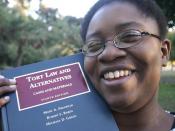Chapter 12
12.1-12.2
1. What is an intentional tort? List three examples in your answer.
An intentional tort is a person deliberately causing harm or loss to another person. Examples are trespassing, causing a nuisance and defaming are intentional torts.
2. Why do many potential tort actions not result in legal actions?
A certain amount of interference with individuals' right occurs on a daily basis and is considered acceptable in a busy, interactive society.
3. Why might a young child not be held responsible for an intentional tort?
Children must be aware of the consequences of their actions.
4. Why is motive not an important factor in an intentional tort?
Providing it was not malicious, it is not an essential element in a tort action.
5. Is mistake a defense against an intentional tort? Explain.
No, it is not a defense against an intentional tort. You are responsible for your actions and the consequences even if they were made in good faith.
12.2-12.3
1. What is the difference between assault and battery?
Assault- causing the victim to reasonably fear that bodily harm may occur.
Battery- intentional physical contact harmful or offensive to another person: the completion of an assault
2. When might punitive damages be awarded for assault and battery?
If an assault is extremely vicious or committed without reason, the court may award punitive damages.
3. When does medical assault and battery occur?
Medical assault and battery occurs when a doctor touches or treats a patient
without voluntary and informed consent.
4. How do the torts of medical negligence and medical battery differ?
They differ because medical negligence is a doctor's failure to exercise reasonable care, and medical battery is when the doctor treats a patient without consent.
5. What two conditions must...


